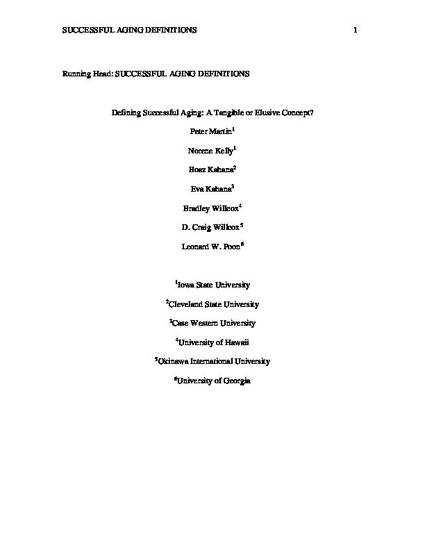
Purpose of the Study:
Everyone wants to age successfully; however, the definition and criteria of successful aging remain vague for laypersons, researchers, and policymakers in spite of decades of research on the topic. This paper highlights work of scholars who made significant theoretical contributions to the topic. Design and Methods:
A thorough review and evaluation of the literature on successful aging was undertaken. Results:
Our review includes early gerontological definitions of successful aging and related concepts. Historical perspectives reach back to philosophical and religious texts, and more recent approaches have focused on both process- and outcome-oriented models of successful aging. We elaborate on Baltes and Baltes’ theory of selective optimization with compensation [Baltes, P. B., & Baltes, M. M. (1990a). Psychological perspectives on successful aging: The model of selective optimization with compensation. In P. B. Baltes & M. M. Baltes (Eds.), Successful aging: Perspectives from the behavioral sciences (pp. 1–34). United Kingdom: Cambridge University Press], Kahana and Kahana’s preventive and corrective proactivity model [Kahana, E., & Kahana, B. (1996). Conceptual and empirical advances in understanding aging well through proactive adaptation. In V. Bengtson (Ed.), Adulthood and aging: Research on continuities and discontinuities (pp. 18–40). New York: Springer], and Rowe and Kahn’s model of successful aging [Rowe, J. W., & Kahn, R. L. (1998). Successful aging. New York: Pantheon Books], outlining their commonalities and differences. Additional views on successful aging emphasize subjective versus objective perceptions of successful aging and relate successful aging to studies on healthy and exceptional longevity. Implications:
Additional theoretical work is needed to better understand successful aging, including the way it can encompass disability and death and dying. The extent of rapid social and technological change influencing views on successful aging also deserves more consideration.
Available at: http://works.bepress.com/peter-martin/30/

This is an accepted manuscript published as Martin, Peter, Norene Kelly, Boaz Kahana, Eva Kahana, Bradley J. Willcox, D. Craig Willcox, and Leonard W. Poon. "Defining successful aging: A tangible or elusive concept?." The Gerontologist 55, no. 1 (2014): 14-25. doi: 10.1093/geront/gnu044. Posted with permission.